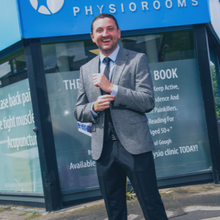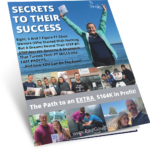 If you haven’t read part 1 of the blog post, check it out: here
If you haven’t read part 1 of the blog post, check it out: here
Don’t Overestimate What You Can Achieve In 12 Months
The other thing to consider about copying the behaviour, commitment and sacrifice of sports stars or athletes is that they have very different career lengths to you and I.
They may have a decade at best. They absolutely have to give it everything they’ve got in that 10-year period because their physical body is the primary driver of the cheques being cashed and medals collected. They have to win at all costs now and they can rest later. That isn’t the case with you and I.
We’ve got so much more time to do what we want with our careers, and we don’t need to try cram it all into one decade.
As Tony Robbins taught me, most people overestimate what they can achieve in one year and underestimate what they can achieve in ten.
Said differently, the fact that you’re working so hard to cram something into such a short period of time is probably the No 1 reason you’re not achieving it.
There’s no thought going into finding the best or most productive way to achieve it – it’s just all about ‘doing’ it.
It’s all tactics and no strategy.
It’s all ideas and no creating of a robust plan.
That’s great if you are addicted to ‘doing’ – but if you like achieving then it’s more about being critical in your thinking and selective in how you will prioritize your time.
And if you’re a business owner, it’s absolutely about how you get the best from your people.
In the end, no matter how you dress it up, what separates those achieving in business from the ones who don’t is how well you can prioritize the use of things like time, money and other people. The ability to prioritize comes from being able to think critically and that is a skill I encourage you to continue to hone.
Understand it like this: whatever the problem, there’s always a solution and that solution always existed. You just couldn’t see it.
Those who are able to think critically are the ones who can come up with different solutions and find more ways to get more things done faster – without compromising and sacrificing more of the things they want to do in life away from business.
What Should You Model From Athletes?
Now there are some cross-over skills that I think you can and should copy from athletes. (I did a podcast on this). Things like focus, courage, commitment, determination and tenacity are skills that we both need. I have spoken about focus many times, but I seem to talk more and more to my group of CEOs about the need to be courageous in business.
It takes courage to make decisions when you’re not certain and it certainly takes courage to hire people when you’re not 100% certain that you know exactly what you’re looking for.
What I love about the top athletes is they resolve to finding a way – regardless of how they feel. Unbeknown to most, they don’t rely upon confidence; instead they default to self-belief. The difference between the two is something that is hugely misunderstood.
One is internal the other is external. In life, most people are waiting for their confidence to appear (external). Yet, it rarely ever does. Why?
Because confidence is something that happens when you get good at something. To get good at it, you’ve first got to start! Most people are being DISCOURAGED from starting something because they don’t feel good about it.
This is the issue.
They don’t feel good so they shy away hoping that next time they’ll feel better. Of course, they don’t.
Now if you never start, how can you get good at something to ever be confident doing it? You can’t. But the paradox is that you have to start to ever have any chance of being good at it and from that confidence appears.
I may appear to be very confident and, in some cases, I am. But, in other areas, I am not.
I am not confident in the minutes before I get on stage to talk to 150 people, so I default to self-belief. About 20 minutes later the confidence starts to flow.
Like you, I am also not confident when I am hiring for positions I have never hired for. How can I be? I haven’t done it before!
To think that I am going to get it right all the time is arrogance. And arrogance stems from fear. Fear is the father of arrogance.
I definitely don’t want to make my decisions from that place so instead I choose to default to SELF-BELIEF (internal). That is always available to me.
If in doubt, go to self-belief. This phrase I use might help you. It goes something like this: “I’m not 100% certain if I am right – but I am 100% certain I’ll be OK”.
The two things are very different. Another one I use is: “I don’t know exactly how this going to play out, but I know I’ll figure it out”.
They are two very simple ways that I can go back home to my core and both are my own ‘north stars’ that get me through the situations where I am not all that confident. Try it for yourself. It’s absolutely something that the top athletes do.
The ones with lots of talent and inconsistent results, they are the ones always waiting for confidence to show up. The best of the best don’t need confidence. They know it follows after their self-belief kicks in.
In the end, success and extreme achievement comes from understanding yourself and having a clear vision – something that all who achieve can agree on.
The things to understand about yourself include the false beliefs that are holding you back, bad habits, destructive actions, how fear-based thinking works, shedding the constant feeling of guilt and any expectations of other people that send you into a tail wind of emotion the minute those expectations are not met.
All of these things are under the banner of ‘understanding yourself’ and I believe the more work you do the work around this the faster you will find yourself achieving more.
Which would be a nice bonus, right?
Learn From the Success of These Ultimate PT CEOs
 Want to get advice from Physical Therapy clinic owners who are hugely successful as CEOs of their own private practices?
Want to get advice from Physical Therapy clinic owners who are hugely successful as CEOs of their own private practices?
These clinic owners were able to increase their profit by over $160,000 while reducing their time treating patients by 15 hours a week!
Read these essays to discover what marketing campaigns these private practice owners implemented to help reach their success. Discover how they made use of their involvement in Paul’s Mastermind Program to grow their clinics. And read about the top 3 things each business leader did that helped their growth the most.
